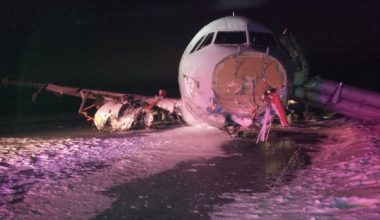Flying can be convenient, but a laundry list of factors can impede a seamless air travel experience. Every traveler’s worst nightmare is a delayed or canceled flight as their plans unexpectedly go sideways. Airline delays and cancelations are a year-round problem and a reality of modern air travel. Despite airlines’ attempts to operate 100% of flights on schedule, passengers still face such dreary situations. The travel plans of hundreds of passengers hang in limbo when a flight gets canceled or delayed by hours.

In the US, there is no such law in place that offers passenger protection when something unexpected happens. Luckily, passengers flying in, out, or within Europe are protected under European Regulation 261/2004. They can stand up for the rights outlined by the EU 261 law when their flight is delayed or canceled. Having that said, how exactly does the EU 261 law work? What rights can you exercise under the EU 261 law, and when?
What is EU 261?
The EU Regulation 261/2004, commonly referred to as EU 261, is legislation that establishes minimum rights and protections for passengers affected by flight delays or cancelations. The EU 261 law offers protection against the inconvenience caused by delays or cancellations of flights within, to, or from the European Union.
It entitles passengers (traveling within the EU) to monetary relief in the event of flight cancelations, delays, or denied boardings. The stature establishes specific conditions under which airlines must compensate passengers and outlines the treatment standards for affected customers.
Under this regulation, depending upon the situation, the passengers may invoke:
- Right to be economically compensated
- Right to reimbursement or rerouting or
- Right to care
Flights covered by the EU216 law
Since EU216 is a European Union regulation, its rule on air passenger rights applies to flights within, to, or from the EU. The geographical territory (EU or non-EU airspace) and type of carrier (EU or non-EU airline) come into play when deciding whether or not EU261 covers the flight.

For a flight to qualify for compensation under the EU, it must fulfill one of the following conditions:
- The flight departs from one EU member state to another member state on any carrier (EU or non-EU)
- The flight departs from the EU member state to the non-member country on any airline
- The flight arrives from outside of the EU at any EU airport on an EU-registered airline
You will qualify for the EU261 compensation if the canceled or delayed flight fits into one of these categories.
(Note: There are 27 EU member states, but the EU261 also applies to flights to/from Iceland, Switzerland, Norway, and most outlying territories. These territories include Guadeloupe, French Guiana, Madeira, the Canary Islands, the Azores, Reunion Island, Martinique, Mayotte, and Saint-Martin.)
If you are traveling from a non-member country to Europe with a non-EU carrier, you can’t submit compensation claims. On the other hand, you also won’t be eligible for EU 261 protection while flying outside of the EU to non-EU on any carrier. This way, even an EU airline-operated flight departing or arriving at a non-EU airport doesn’t fall under the coverage of EU261.
Application of the EU 261 law: for whom?
The EU261 law applies to any passenger traveling on an eligible flight (as mentioned above). However, to claim the compensation, the passenger must have a confirmed ticket purchased at a fare available to the public. Those flying on free or reduced fares (e.g., airline employee discounts) not available to the general public aren’t entitled to benefits under EU261. Nonetheless, the EU 261 protection is available for those traveling on flights booked on loyalty programs.

On top of having a confirmed ticket, passengers must present themselves for check-in at the airport. The EU261 law doesn’t apply if the airline denies boarding to any customer on the grounds of health, safety, or improper travel documentation.
You can invoke air passenger rights under EU261 if you meet these eligibility requirements.
Situations under which EU261 law applies
1. Flight cancellations
Under EU261 law, the qualified flight is considered canceled in one of the following cases:
- You are shifted to another scheduled flight because your original flight got canceled
- The aircraft took off but returned to the origin airport, resulting in your transfer to a different flight
- Your flight landed at an airport that doesn’t match the airport of your original itinerary (unless you consented to reroute to an alternative airport).
Note: the flight is not covered by the EU 261 statute if:
- The airline informs you about the cancellation minimum of two weeks before the scheduled takeoff.
- The airline informs you of the cancellation between 14-7 days before scheduled departure and offers you a rerouting.
- The airline informs you about the cancellation less than a week before the original schedule (and provides you a reroute leaving no more than 2 hours before scheduled takeoff and arriving less than 4 hours after the scheduled landing)
2. Flight delay
According to the EU261 statute, a flight is deemed delayed if it departs 3 hours (or more) later than its scheduled departure time. It’s considered a flight delay whenever a customer is delayed three or more hours about his/her arrival at the final destination.
If passengers suffer a delay of two hours or more on flights of 1500km or less, airlines must provide them meals plus two free phone calls or emails.
The airline must pay you the flight compensation if your flight is delayed by three hours or more from its scheduled takeoff. But, if extraordinary circumstances cause the delay and are outside the airline’s control, EU passenger rights do not apply. Extraordinary circumstances refer to external events such as weather, political strife, etc., beyond the airline’s reach. The carrier won’t be held responsible for covering the costs if it demonstrates it took all reasonable measures to prevent the delay.
3. Denied boarding
Before bumping customers from their flight, the airline often requests volunteers to give up their place in exchange for an agreed compensation. If you volunteer to be bumped, you’ll be entitled to receive care and an alternative flight or a refund. Sometimes, the carrier denies boarding without your agreement, entitling you to rights to compensation, reimbursement or rerouting, and care.
4. Downgraded
Flight downgrade is when the airline involuntarily places you in a lower class than the one you purchased tickets for. For example, the airline shifts you to economy class despite paying for business class seats.
The current EU regulation allows you to submit claims for compensation from the operating carrier in case of flight downgrade. The carrier must pay you the level of compensation depending on the length of your journey within seven days.
Length of journey Compensation
1500km or less than 30% of the ticket segment price
Between 1500 and 3500km, 50% of the ticket segment price
More than 3500km, 75% of the ticket segment price
Passenger rights established by EU261 law

1. Right to compensation
The ‘right to compensation’ entitles passengers to receive a certain amount in compensation from the carrier in cases of a flight delay (3 or more hours) or cancellation. The carrier will make payment based on the distance of your intended flights. The greater the flight distance, the higher will be the financial compensation.
Flight distance Compensation amount
1500km or less EUR 250 per passenger
Between 1500 and 3500km EUR 400 per passenger
More than 3500km EUR 600 per passenger
If the customer accepts rerouting on an alternative flight to the final destination, the compensation will reduce by 50%.
2. Right to reimbursement or rerouting
Passengers whose flight is delayed by 5 hours or more to their final destination have the ‘right to reimbursement or rerouting.’ Under this rule, the carrier reimburses you the full cost of the ticket for the part or parts of the tickets not used within seven days. If this option doesn’t fare well, the passenger can reroute to the final destination at the earliest opportunity or later at his/her convenience.
3. Right to care
EU 261’s Right to Care authorizes passengers on a delayed flight to receive the airline’s assistance depending on the length of the delay. In reasonable relation to the waiting time, the carrier must provide them with meals, refreshments, and two telephone calls or emails. If the flight is delayed at least a day after the originally scheduled departure, airlines should provide the following:
- Hotel accommodation if a stay of one or more nights is needed (for free)
- Transport between the airport and hotel (for free)
What if the airline doesn’t compensate you under the EU261 law?
What should you do if the airline doesn’t abide by the EU261 law and offer you the financial compensation described in the regulation? If you qualify for the benefits but still get dismissed, you can complain to the relevant national enforcement body.






